Neolithic age - Study guides, Class notes & Summaries
Looking for the best study guides, study notes and summaries about Neolithic age? On this page you'll find 319 study documents about Neolithic age.
Page 4 out of 319 results
Sort by

-
HUMA 1301 TEST 1 || very Flawless.
- Exam (elaborations) • 12 pages • 2024
-
- $11.49
- + learn more
What are the 6 characteristics of civilized societies and of "civilization"? correct answers 1. Urban life--cities. 2. System of government 3. Social classes, wealth, and occupation. 4. Tools and specialized skills for the production of goods, leads to the rise of trade and manufacturing. 5. Some from of written communication. 6. A shared system of religious beliefs. Which of these can be found also in lesser-developed human societies? correct answers Mesopotamia--a story of a succes...

-
History of Western Civilization Key PASSED Exam Questions and CORRECT Answers
- Exam (elaborations) • 5 pages • 2024
- Available in package deal
-
- $7.99
- + learn more
Paleolithic Age Period before 12,000 years ago, hunter-gatherer lifestyle Neolithic Revolution Development of agriculture, settled communities Jericho One of the first Neolithic farming villages in Palestine Catalhoyuk One of the largest Neolithic farming villages in Turkey Mesopotamia Land between Tigris and Euphrates Rivers, home of first civilization in Near East
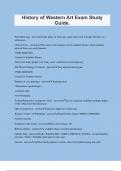
-
History of Western Art Exam Study Guide.
- Exam (elaborations) • 4 pages • 2024
-
- $10.49
- + learn more
History of Western Art Exam Study Guide. Paleolithic Age - answerearly phase of stone age, stone tools used, nomadic lifestyle, no settlements Chauvet Cave - answerThe name of the famous cave in southern France which contains artwork from very early humans BCE Located in Southern France Done from many people over many years; used burnt wood (charcoal) The Horse Painting at Chauvet - answerVery detailed and elegant BCE Located in Southern France Purpose of cave paintings - answer-hu...

-
Test Bank for Art History, 6th Edition, Marilyn Stokstad
- Exam (elaborations) • 14 pages • 2023
-
- $11.49
- 1x sold
- + learn more
Multiple Choice 1. Archaeologists link the emergence of image making to the arrival of A. Homo sapiens. B. Neanderthals. C. Homo sapiens sapiens. D. Homo erectus. Answer: C Learning Objective: 1.c Relate Paleolithic, Neolithic, and Bronze Age artists and art to their cultural, economic, and political contexts. Topic: The Stone Age Difficulty Level: Moderate Skill Level: Understand the Concepts 2. Prehistoric people often coated their floors with powdered A. ash. B. bones. C. clay....
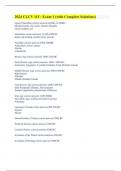
-
2024 CLCV 115 - Exam 1 (with Complete Solutions)
- Exam (elaborations) • 10 pages • 2023
-
Available in package deal
-
- $11.49
- + learn more
Upper Paleolithic correct answers 40,000-12,500BC Human burials, fire, tools, abstract thought; Great Goddess, art Mesolithic correct answers 12,500-8500 BC Improved hunting, smaller tools; jewelry Neolithic correct answers BC Agriculture, towns, poetry Jericho Çatalhöyük Bronze Age correct answers BC Early Bronze Age correct answers BC Sumerians, Egyptians, Cycladic Islanders, Early Helladic Greeks Middle Bronze Age correct answers BC Babylonians Minoans Middle H...
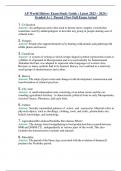
-
AP World History Exam Study Guide ( Latest 2023 – 2024 ) Graded A+ | Passed | New Full Exam Actual
- Exam (elaborations) • 21 pages • 2023
-
Available in package deal
-
- $8.99
- + learn more
AP World History Exam Study Guide ( Latest 2023 – 2024 ) Graded A+ | Passed | New Full Exam Actual 1. Civilization Answer: An ambiguous term often used to denote more complex societiesbut sometimes used by anthropologists to describe any group of people sharing aset of cultural traits. 2. Foragers Answer: People who support themselves by hunting wild animals and gatheringwild edible plants and insects. 3. Cuneiform Answer: A system of writing in which wedge-shaped symbols represent...
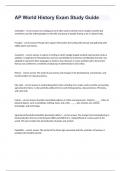
-
AP World History Exam Study Guide With Complete Answer.
- Exam (elaborations) • 19 pages • 2024
-
Available in package deal
-
- $12.99
- + learn more
Civilization - correct answer An ambiguous term often used to denote more complex societies but sometimes used by anthropologists to describe any group of people sharing a set of cultural traits. Foragers - correct answer People who support themselves by hunting wild animals and gathering wild edible plants and insects. Cuneiform - correct answer A system of writing in which wedge-shaped symbols represented words or syllables. It originated in Mesopotamia and was used initially for Sumeria...

-
NST2602 ASSIGNMENT 2.
- Exam (elaborations) • 13 pages • 2022
-
- $3.00
- 4x sold
- + learn more
NST2602 ASSIGNMENT 2. STUDENT NAME & SURNAME: SHANICE STORM JOHNS STUDENT NUMBER: MODULE: NST 2602 ASSIGNMENT REFERENCE NUMBER: Assignment 02: DATE OF SUBMISSION: 27/06/21 Image source: Google images QUESTION 1 Choose any THREE time periods. In each time period write a paragraph of ten lines based on your understanding of the differences of the time periods. Locate the time period in your own context. (15) 1. Bronze Age The Bronze Age was a prehistoric period marked by the usag...
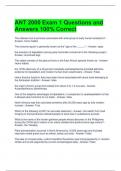
-
ANT 2000 Exam 1 Questions and Answers 100% Correct
- Exam (elaborations) • 5 pages • 2024
-
Available in package deal
-
- $12.99
- + learn more
ANT 2000 Exam 1 Questions and Answers 100% Correct The oldowan tool is primarily associated with what group of early human ancestors? - Answer- homo habilis The miocene epoch is generally known as the "age of the ______" - Answer- apes the evolution of bipedalism among early hominids involved all of the following except: - Answer- shortened legs The oldest member of the genus Homo is the East African species known as - Answer- Homo habilis the 1970s discovery of a 40-percent ...
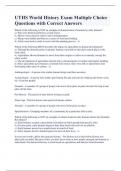
-
UTHS World History Exam Multiple Choice Questions with Correct Answers
- Exam (elaborations) • 33 pages • 2024
-
Available in package deal
-
- $12.99
- + learn more
UTHS World History Exam Multiple Choice Questions with Correct Answers Which of the following is NOT an example of domestication of animals by early humans? a.) Pigs were herded and bred as a food source. b.) Horses were tamed in order to aid in transportation. c.) Sheep were herded and bred as a source of food and clothing. d.) Cattle were bred in order to assist with the planting process. - b Which of the following BEST describes the impact of agriculture on human development? a.) ...

$6.50 for your textbook summary multiplied by 100 fellow students... Do the math: that's a lot of money! Don't be a thief of your own wallet and start uploading yours now. Discover all about earning on Stuvia


